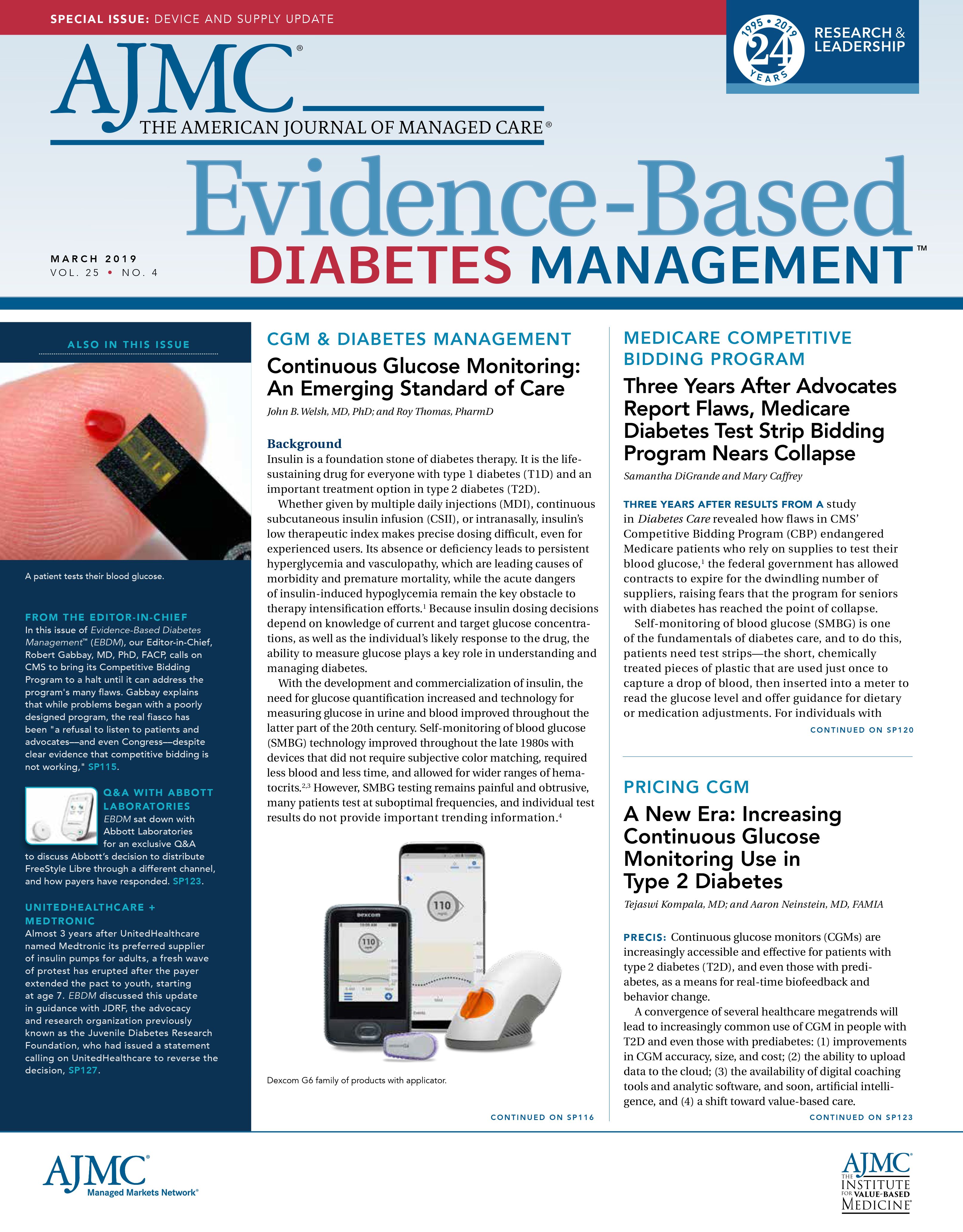- Center on Health Equity & Access
- Clinical
- Health Care Cost
- Health Care Delivery
- Insurance
- Policy
- Technology
- Value-Based Care
From the Editor-in-Chief: Halt the Glucose Test Strip Bidding Program Until It Can Be Fixed
Even when things go well, managing diabetes is not easy. Keeping tabs on this disease 24/7 takes planning, commitment, support, and the right tools. For years, a chief complaint among those living with diabetes has been that managed care nickel-and-dimes people over basic supplies, which are comparatively cheap—things like test strips and sensors for a continuous glucose monitor—but will shell out thousands for dialysis and amputations. In the years ahead, if Congress wants to understand rising costs for end-stage renal disease or an increase in emergency department visits for hypoglycemia, it should look directly to CMS’ foray into competitive bidding for blood glucose test strips.
Even when things go well, managing diabetes is not easy. Keeping tabs on this disease 24/7 takes planning, commitment, support, and the right tools. For years, a chief complaint among those living with diabetes has been that managed care nickel-and-dimes people over basic supplies, which are comparatively cheap—things like test strips and sensors for a continuous glucose monitor—but will shell out thousands for dialysis and amputations. In the years ahead, if Congress wants to understand rising costs for end-stage renal disease or an increase in emergency department visits for hypoglycemia, it should look directly to CMS’ foray into competitive bidding for blood glucose test strips.
CMS’ failure started with a poorly designed program, but the real fiasco has been a refusal to listen to patients and advocates—and even Congress—despite clear evidence that competitive bidding is not working. Seniors with diabetes are not merely inconvenienced by the complicated test strip procurement program; they cannot get their supplies in a timely manner, and many have simply given up trying. In a presentation dating as far back as 2015, Gary Puckrein, PhD, and his colleagues at the National Minority Quality Forum showed that people with diabetes in the initial CMS test markets had worse outcomes, that hospitalizations increased, and even that the test markets were associated with increased mortality. Puckrein et al published full results on the CMS pilot in 20161 and did a follow-up on the effects of the nationwide rollout last May. Their bottom-line conclusions are unchanged; the 2018 study found that disruptions had “persisted and worsened.”2
In other words, the government’s bidding program for test strips is harming people. If a drug were shown to do this, it would be pulled from the market. Instead, CMS has expanded the bidding program to the rest of the country.
Now, as we report in this issue of Evidence-Based Diabetes Management™, the failure to stop the program and fix it has pushed it to the point of collapse. By driving prices for test strips below their actual cost, CMS has pushed out reputable suppliers—advocates told us that it seems all mail-order vendors have dropped out. Inattention created by changes in HHS leadership allowed durable medical equipment contracts to expire, and a new proposal excludes diabetes products because Congress demanded that CMS deal with them separately due to problems in the current program. But rather than admit defeat, CMS lets the current system linger on life support, refusing to admit that depending on where patients live, some have few options. (CMS has declined comment except to say it is preparing a new proposal for both mail-order and retail suppliers in diabetes care.)
Patients who lack the right testing supplies cannot properly dose insulin and are at higher risk of severe hypoglycemia; failing to test properly in the long term puts them at risk of multiple health problems. As Charleston, Mississippi, pharmacist Robert Salmon, RPh, tells us, it’s foolish to increase barriers to glucose testing given the consequences. Yet CMS has done just that—all while declaring victory for achieving “savings.”
The only thing CMS should be declaring is an emergency. It should scrap the current system and take steps to get new suppliers in the market temporarily while it fixes the program. Budget language from Congress shows its intent on this matter is clear, and as the evidence shows, lives are at risk.
REFERENCES:
- Puckrein G, Nunlee-Bland G, Zangeneh F, et al. Impact of CMS Competitive Bidding Program on Medicare beneficiary safety and access to diabetes testing supplies: a retrospective, longitudinal analysis. Diabetes Care. 2016;39(4):563-571. doi: 10.2337/dc15-1264.
- Puckrein G, Hirsch I, Parkin C, Taylor B, Xu L, Marrero D. Impact of the 2013 national rollout of CMS Competitive Bidding program: the disruption continues. Diabetes Care. 2018;41(5):949-955. doi: 10.2337/dc17-0960.

Building Trust: Public Priorities for Health Care AI Labeling
January 27th 2026A Michigan-based deliberative study found strong public support for patient-informed artificial intelligence (AI) labeling in health care, emphasizing transparency, privacy, equity, and safety to build trust.
Read More

